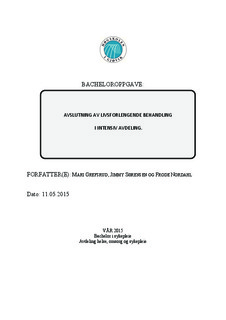| dc.contributor.author | Nordahl, Frode | |
| dc.contributor.author | Sørensen, Jimmy Peter | |
| dc.contributor.author | Grefsrud, Mari | |
| dc.date.accessioned | 2015-07-17T08:01:30Z | |
| dc.date.available | 2015-07-17T08:01:30Z | |
| dc.date.issued | 2015 | |
| dc.identifier.uri | http://hdl.handle.net/11250/293308 | |
| dc.description.abstract | NORSK: Bakgrunn: Forskning, både internasjonalt og i Norge viser til at overbehandling av pasienter på
slutten av livet er ett økende etisk dilemma. I ett samfunn med stadig mer avansert teknologi,
flere behandlingsalternativer og voksende konsumerinformasjon rapporterer helsearbeidere om
øktende press fra pasienter, familier og kollegaer om å gi intensiv, livsforlengende behandling.
Mål: Å få en dypere forståelse av intensivsykepleiers rolle i beslutningsprosessen rundt
tilbaketrekning av livsforlengende behandling.
Metode:
Denne oppgaven er en litteraturstudie. Vi søkt etter vitenskapelige artikler via databasene: Cinahl,
Ovid Nursing database, Oria, Google scholar, medline og Proquest. Gjennom analyser av
artiklene og drøfting av artiklenes funn har vi fått svar på vår problemstilling.
Resultat:
Intensivsykepleier er den i behandlingsteamet som først gjennom sine observasjoner stiller
spørsmål om pasientens behandlingspotensial. Sykepleiernes tette kontakt med pasient og
pårørende gir de en unik mulighet til å skaffe seg et helhetlig bilde av pasienten. Dårlig
kommunikasjon, ulike verdier og dårlig samarbeid i beslutningsprosessen førte til nytteløs
behandling. Sykepleiere følte at det i noen tilfeller var vanskelig å utføre det legen hadde
ordinert.
Konklusjon:
Sykepleier innehar verdifull informasjon som må vektlegges om man skal kunne fatte en
beslutning basert på faglig forsvarlighet der pasientens ønsker blir respektert. | nb_NO |
| dc.description.abstract | ENGLISH: Introduction:
Research, both international and in Norway shows that over-treating patients towards the end of
life is an increasing ethical dilemma. In a society with constantly advancing technology, more
alternatives for treatment and growing consumer information, health workers are reporting
increasing pressure from patients, families and colleagues to give life-prolonging treatment.
Aim:
Is to achieve a deeper understanding of the Intensive Care nurses’ role in the decision-making
process concerning withdrawal of life-prolonging treatment.
Method:
This is a literature review. We sought scientific articles via the following databases: Cinahl, Ovid
Nursing database, Oria, Google scholar, medline og Proquest. Through analysis of the articles
and discussing findings, we have come to an answer to our question.
Result:
The Intensive Care nurse is the first member of the nursing team that, by means of observation,
questions the patients’ potential for treatment. Their close contact with the patient and their
relatives gives a unique opportunity to obtain an overall picture of the patients’ situation. Poor
communication, different values and poor cooperation in the decision-making process led to
fruitless treatment. Nurses felt that in some cases it was difficult to follow the doctors’ orders.
Conclusion:
The nurse possesses valuable information that must be given attention if a decision based on
academic justifiability is to be taken where the patients’ wishes are respected. | nb_NO |
| dc.language.iso | nob | nb_NO |
| dc.subject | intensivsykepleie | nb_NO |
| dc.subject | beslutningsprosess | nb_NO |
| dc.subject | livsforlengende behandling | nb_NO |
| dc.title | Hvordan kan intensivsykepleier kvalitetssikre og ivareta pasienten i beslutningsprosessen, når det kommer til spørsmål om livsforlengende behandling hos pasienter uten samtykkekompetanse? | nb_NO |
| dc.title.alternative | How the intensive care nurse assure quality and care for the patient in the decision-making process when it comes to questions about life-prolonging treatment to patients without consent? | nb_NO |
| dc.type | Bachelor thesis | nb_NO |
| dc.subject.nsi | VDP::Medical disciplines: 700::Health sciences: 800::Nursing science: 808 | nb_NO |
| dc.source.pagenumber | 49 | nb_NO |
